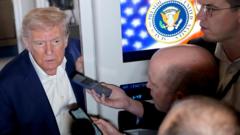In a notable shift, President Trump's administration has exempted several electronic devices from steep tariffs, aiming to alleviate concerns for tech companies and consumers. This strategic move is seen as a potential game-changer for the tech industry, which has been heavily impacted by previous tariff measures.
Trump Adjusts Tariff Strategy, Exempting Key Electronic Goods

Trump Adjusts Tariff Strategy, Exempting Key Electronic Goods
The Trump administration's recent decision to exclude smartphones, computers, and other electronic devices from new tariffs has sparked varying responses from industry experts and political analysts.
In a surprising turn of events, the Trump administration has decided to exempt various electronic devices including smartphones and computers from proposed tariffs, offering relief to tech companies and consumers ahead of potential price hikes. The announcement, made by US Customs and Border Patrol, indicates that these goods will no longer be subject to a blanket 10% global tariff imposed on many countries, nor the significantly higher 125% tariffs placed on Chinese imports.
While en route to Miami, President Trump indicated that further details regarding these exemptions would be announced early next week, emphasizing that while tariffs are designed to generate revenue, the adjustments also aim to facilitate flexibility within the tech industry. "As a country, we're taking in a lot of money," he stated during a conversation with reporters aboard Air Force One.
The exemptions come in response to growing apprehensions from major US tech companies about increasing consumer costs resulting from tariff impacts. Industry analysts are predicting that the removal of tariffs on electronic devices, which also extends to other components such as semiconductors and solar cells, could drastically influence market dynamics. Dan Ives, chief of technology research at Wedbush Securities, heralded the decision as a "dream scenario for tech investors," describing the inclusion of smartphones and chips in the exemption as a "game-changer" in the ongoing trade conflict with China.
The White House has framed these exemptions as necessary for encouraging US companies to relocate their manufacturing back home. White House Press Secretary Karoline Leavitt emphasized that the goal is to reduce reliance on Chinese production for critical technology goods. "President Trump’s direction has compelled these companies to hustle to onshore their manufacturing in the United States," Leavitt noted.
Despite these recent changes, the 20% tariff related to fentanyl issues remains on Chinese imports, and prices for products like the iPhone could have spiked if tariff costs were passed on to consumers. As Apple and other companies reassess their supply chains, there is a growing trend toward diversifying production away from China, with India and Vietnam emerging as potential manufacturing centers.
This latest pivot in tariff policy follows President Trump's controversial decision to pause multiple upcoming tariff increases in an attempt to negotiate better trade terms with other nations. Initially slated to enforce steep tariffs globally, Trump altered the approach as a strategic maneuver to maintain trade leverage with those countries that had not retaliated against US tariffs. The administration claims that the continued use of import taxes will correct imbalances in the international trade landscape and encourage domestic job growth.
As tariffs continue to evolve, the implications for both consumers and manufacturers remain a critical topic of discussion in the global economy.


















